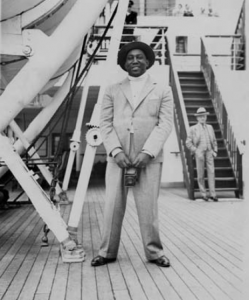Podcast: Play in new window | Download (Duration: 1:37:54 — 99.6MB) | Embed
Subscribe: Spotify | TuneIn | RSS | More
This week I present an important African American artist who has been nearly forgotten by history: the bass-baritone Jules Bledsoe (1897-1943). He is most remembered for creating the role of Joe in Jerome Kern and Oscar Hammerstein II’s Show Boat, but he was equally celebrated in his time for his memorable concerts, which took place both here and in Europe, and for his operatic portrayals, most significantly, the title role in Louis Gruenberg’s opera The Emperor Jones, based on the play by Eugene O’Neill, which he portrayed both in the United States and in Europe. When this opera premiered at the Metropolitan Opera in 1933, the legendary baritone Lawrence Tibbett created the title role (in blackface). Barred from singing at the Met because of his race, Bledsoe took his portrayal of Brutus Jones on the road, performing it in a triumphant European tour, but also subsequently in New York in 1934 under the aegis of the short-lived Aeolian Opera Company, which was intended to provide performing opportunities for Black opera singers, but which folded almost immediately. Jules Bledsoe was also a composer who wrote many songs and arrangements of spirituals, as well as a version of Uncle Tom’s Cabin entitled Bondage, as well as his own operatic setting of O’Neill’s Emperor Jones, which may or may not have been performed at the time. Even less well-known and acknowledged is that Jules Bledsoe was a gay man in a relationship with a Dutch white man named Freddy Huygens who at the time of Bledsoe’s premature death was referred to as either his “manager” or his “closest friend.” I present examples of all the extant recorded material I could find by Jules Bledsoe, alongside recorded examples of work by his collaborators Abbie Mitchell, Irene Dunne, Anne Roselle, Marie Powers, Todd Duncan and excerpts from the work of composers W. Franke Harling, Shirley Graham Du Bois, and Louis Gruenberg performed by Jeanette MacDonald, Valaida Snow, Nicola Rossi-Lemeni, and Lawrence Tibbett. Billie Holiday even puts in a special appearance! The episode also includes tributes to the recently departed British soprano Joan Carlyle and the US-American bass-baritone Jake Gardner.
Countermelody is a podcast devoted to the glory and the power of the human voice raised in song. Singer and vocal aficionado Daniel Gundlach explores great singers of the past and present focusing in particular on those who are less well-remembered today than they should be. Daniel’s lifetime in music as a professional countertenor, pianist, vocal coach, voice teacher, and journalist yields an exciting array of anecdotes, impressions, and “inside stories.” At Countermelody’s core is the celebration of great singers of all stripes, their instruments, and the connection they make to the words they sing. By clicking on the following link (https://linktr.ee/CountermelodyPodcast) you can find the dedicated Countermelody website which contains additional content including artist photos and episode setlists. The link will also take you to Countermelody’s Patreon page, where you can pledge your monthly support at whatever level you can afford. Bonus episodes available exclusively to Patreon supporters are currently available and further bonus content including interviews and livestreams is planned for the upcoming season.
